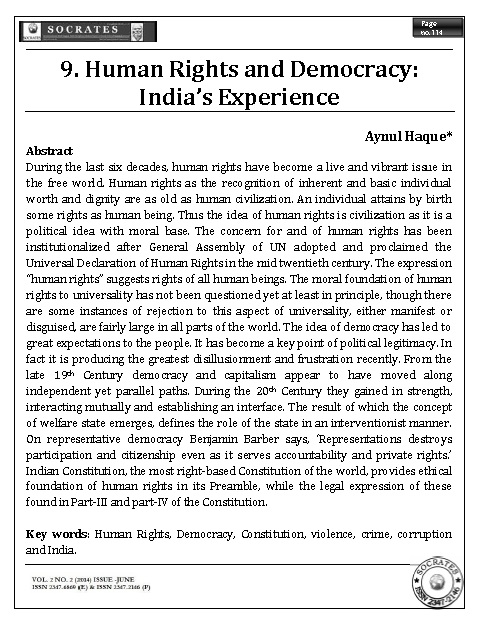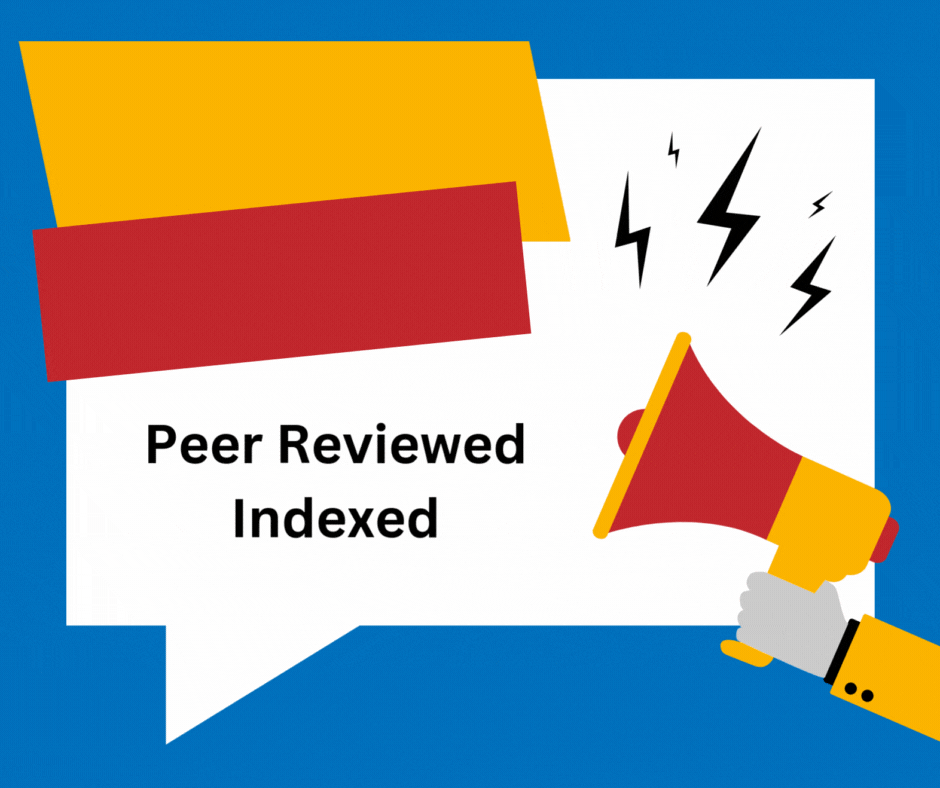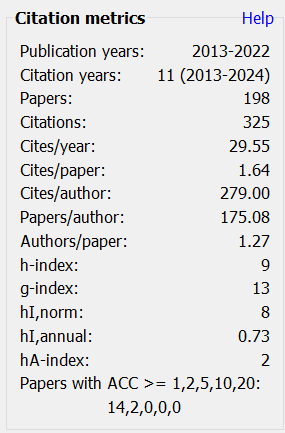Human Rights and Democracy
India’s Experience
Keywords:
Human Rights, Democracy, Constitution, violence, crime, corruption and IndiaAbstract
During the last six decades, human rights have become a live and vibrant issue in the free world. Human rights as the recognition of inherent and basic individual worth and dignity are as old as human civilization. An individual attains by birth some rights as human being. Thus the idea of human rights is civilization as it is a political idea with moral base. The concern for and of human rights has been institutionalized after General Assembly of UN adopted and proclaimed the Universal Declaration of Human Rights in the mid twentieth century. The expression “human rights” suggests rights of all human beings. The moral foundation of human rights to universality has not been questioned yet at least in principle, though there are some instances of rejection to this aspect of universality, either manifest or disguised, are fairly large in all parts of the world. The idea of democracy has led to great expectations to the people. It has become a key point of political legitimacy. In fact it is producing the greatest disillusionment and frustration recently. From the late 19th Century democracy and capitalism appear to have moved along independent yet parallel paths. During the 20th Century they gained in strength, interacting mutually and establishing an interface. The result of which the concept of welfare state emerges, defines the role of the state in an interventionist manner. On representative democracy Benjamin Barber says, ‘Representations destroys participation and citizenship even as it serves accountability and private rights.’ Indian Constitution, the most right-based Constitution of the world, provides ethical foundation of human rights in its Preamble, while the legal expression of these found in Part-III and part-IV of the Constitution.
Downloads
Metrics
References
BAEHR, P.R. (2001), HUMAN RIGHTS: UNIVERSALITY IN PRACTICE. NEW YORK, PALGRAVE.
BAKSHI,P.M.(2005),THE CONSTITUTION OF INDIA.NEW DELHI,UNIVERSAL LAW PUBLISHING COMPANY
BBC NEWS (26.10.2006), INDIA TACKLES DOMESTIC VIOLENCE. HTTP://NEWS.BBC.CO.UK/GO/PR/FR/-/2/HI/SOUTH_ASIA/6086334.STM
BEETHAM,D (2006),DEMOCRACY: A BEGINNER’S GUIDE. OXFORD, ONEWORLD PUBLICATION.
BHUIMALI, A (2007),DEMOCRACY AND HUMAN RIGHTS. NEW DELHI, SERIALS PUBLICATIONS.
BRONITT, S AND MISRA,A, REFORMING SEXUAL OFFENCES IN INDIA: LESSONS IN HUMAN RIGHTS AND COMPARATIVE LAW. GRIFFITH ASIA QUARTERLY VOL. 2, NO. 1 (2014).
CHATTERJEE,P(2008),STATE AND POLITICS IN INDIA. NEW DELHI,OXFORD UNIVERSITY PRESS.
CHATTOPADHYAY,B,GUHA,A.R AND CHATTERJEE,R (2002). KOLKATA, PROGRESSIVE PUBLISHERS.
CRIME IN INDIA (2012) STATISTICS. NEW DELHI, NATIONAL CRIME RECORDS BUREAU, MINISTRY OF HOME AFFAIRS, GOVERNMENT OF INDIA. HTTP://NCRB.NIC.I/CD-CII2012/STATISTICS2012.PDF
CNN-IBN LIVE (AUG 08, 2012). ASSAM VIOLENCE FOUR MORE BODIES FOUND, TOLL RISES TO 77, IBN LIVE NEWS.MHT
CORRUPTION PERCEPTIONS INDEX (2013), TRANSPARENCY INTERNATIONAL. www.transparency.org/cpi.
ENGINEER, A.A. AND NARANG A.S (2006), MINORITIES AND POLICE IN INDIA. NEW DELHI, MANOHAR.
GOULD.C.C(2004),GLOBALIZING DEMOCRACY AND HUMAN RIGHTS. CAMBRIDGE (U.K.), CAMBRIDGE UNIVERSITY PRESS.
HASAN,Z (2002), POLITICS AND THE STATE IN INDIA. NEW DELHI, SAGE PUBLICATIONS.
KOTHARI,R (2007), RETHINKING DEMOCRACY. NEW DELHI, ORIENT LONGMAN.
MONDAL, P(JULY 20,2012),MAOISTS TIPTOE INTO LALGARH. CALCUTTA, THE TELEGRAPH.
OOMMEN,T.K.(2004),NATION,CIVIL SOCIETY AND SOCIAL MOVEMENTS. NEW DELHI, SAGE PUBLICATIONS.
PANDEY,A(APRIL 3 ,2014), INDIA: DEMOCRACY IN A GUTTER, LITERALLY. HONG KONG, CHINA, ASIAN HUMAN RIGHTS
COMMISSION.HTTP://WWW.HUMANRIGHTS.ASIA/NEWS/AHRC-NEWS/AHRC-ART-026-2014/?SEARCHTERM=INDIA DEMOCRACY IN A GUTTER.
ROBINSON,R(2004),SOCIOLOGY OF RELIGION IN INDIA. NEW DELHI, SAGE PUBLICATIONS.
RUKMINI S. (MAY 27, 2014), 14 MINISTERS IN MODI'S CABINET HAVE CRIMINAL CASES AGAINST THEM. NEW DELHI. THE HINDU. HTTP://WWW.THEHINDU.CO/NEWS/NATIONAL/14-MINISTERS-IN-MODIS-CABINET-HAVECRIMINAL-CASES-AGAINST-THEM/ARTICLE6051236.ECE
SHAKIL,A (AUGUST 03,2013),RAPE AND HONOUR CRIMES: THE NCRB REPORT 2012.ECONOMIC AND POLITICAL WEEKLY. VOL - XLVIII NO. 31.
SHAKIR,M(1986), STATE AND POLITICS IN CONTEMPORARY INDIA. DELHI, AJANTA PUBLICATIONS.
SHAKIR,M(1988).RELIGION, STATE AND POLITICS IN INDIA. DELHI, AJANTA PUBLICATIONS.
SINGH, R(2001),SOCIAL MOVEMENTS, OLD AND NEW. NEW DELHI, SAGE PUBLICATIONS.
THE LOKPAL AND LOKAYUKTAS ACT, 2013 (2014). NEW DELHI, MINISTRY OF LAW AND JUSTICE, GOVERNMENT OF INDIA.
WADHWA, K.K. (1975), MINORITY SAFEGUARDS IN INDIA. DELHI, THOMSON PRESS (INDIA) LTD.
KILLED, CURFEW CLAMPED IN KOKRAJHAR (JULY 22, 2012). GUWAHATI, THE ASSAM TRIBUNE.
THE TIMES OF INDIA (MAY 28, 2014), 30% OF MODI'S MINISTERS FACE CRIMINAL CHARGES. NEW DELHI,
THE TIMES OF INDIA.HTTP://TIMESOFINDIA.INDIATIMES.COM/INDIA/30-OF-MODIS-MINISTERS-FACE-CRIMINALCHARGES/ARTICLESHOW/35649298.CMS

Downloads
Published
How to Cite
Issue
Section
License
Revised Copyright/CC license that applies to all the articles published after 05-02-2017
Attribution-NonCommercial 4.0 International (CC BY-NC 4.0)

Copyright/CC license that applies to all the articles published before 05-02-2017
Attribution-Non Commercial-No Derivatives 4.0 International (CC BY-NC-ND 4.0)

Author(s) will retain all the right except commercial and re-publishing rights. In the case of re-publishing, they will have to obtain written permission from the journal. Additional licensing agreements (Creative Commons licenses) grants rights to readers to copy, distribute, display and perform the work as long as you give the original author(s) credit, they can not use the works for commercial purposes and are not allowed to alter, transform, or build upon the work. For any reuse or distribution, readers and users must make clear to others the license terms of this work. Any of these conditions can be waived if you get permission from the copyright holders. Nothing in this license impairs or restricts the authors’ rights. To view a copy of this license, visit http://creativecommons.org/licenses/by-nc-nd/4.0/ or send a letter to Creative Commons, 171 Second Street, Suite 300, San Francisco, California, 94105, USA.
Research Papers published in SOCRATES are licensed under an Attribution-NonCommercial-NoDerivatives 4.0 International (CC BY-NC-ND 4.0)












